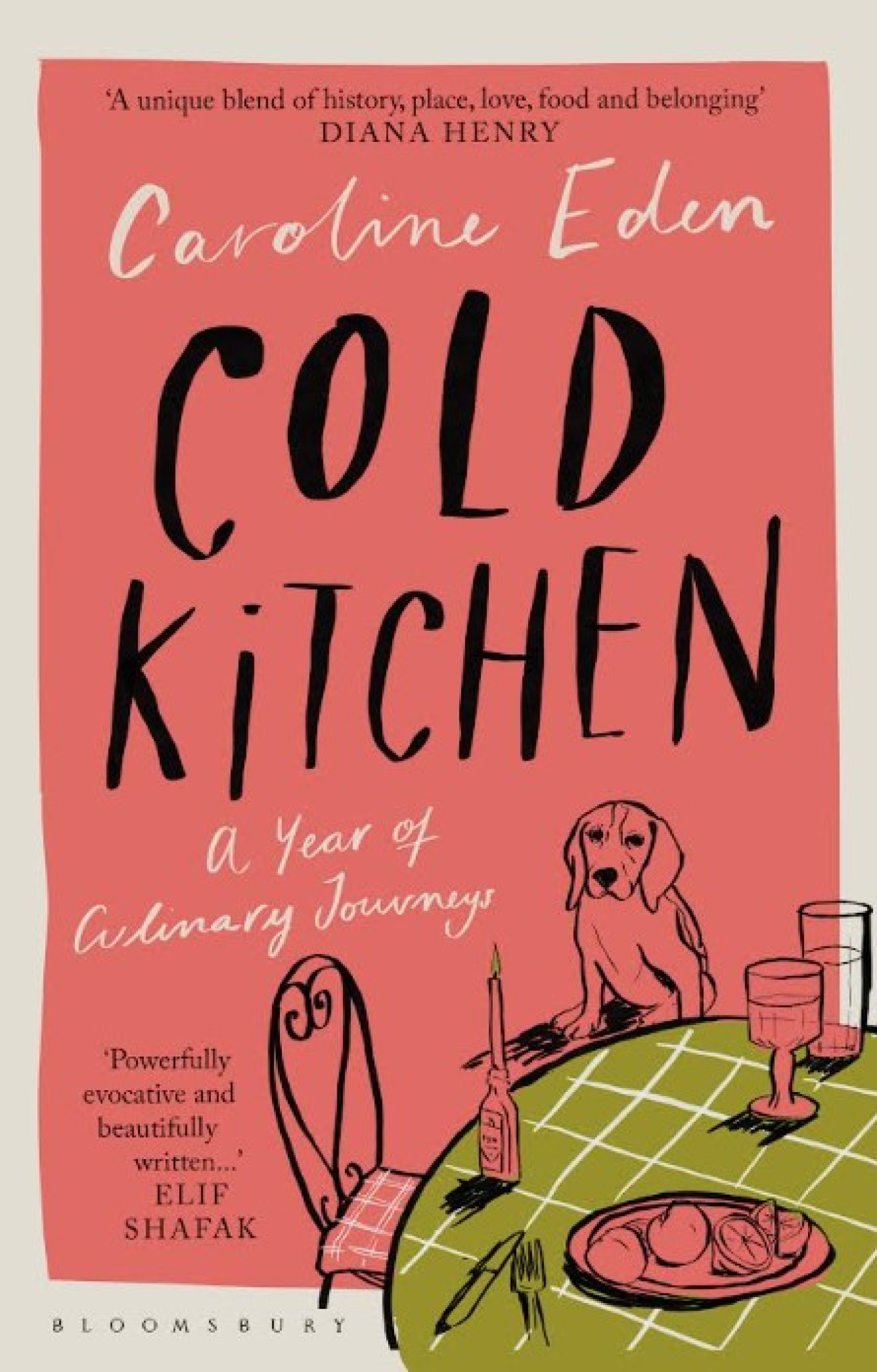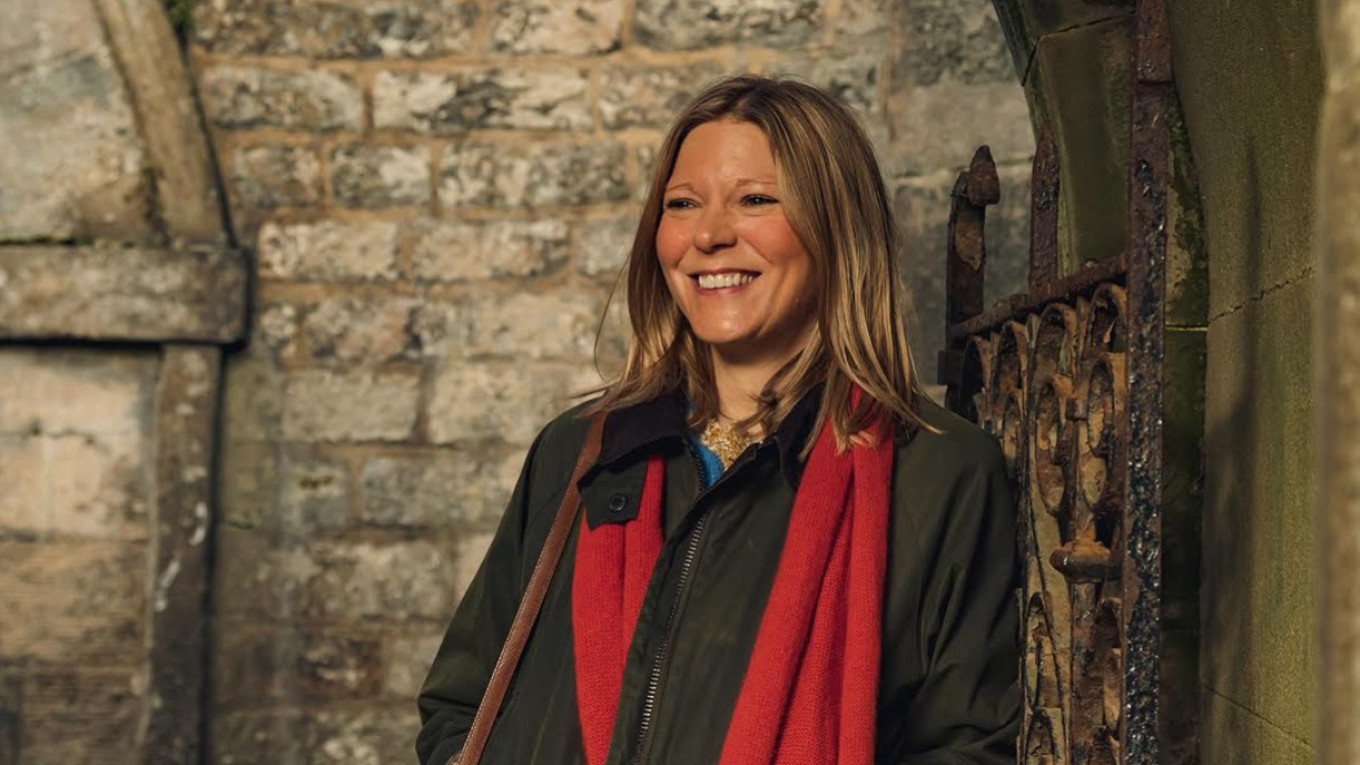“Cold Kitchen. A Year of Culinary Journeys” by Caroline Eden is a book that arouses both wanderlust and physical appetite. Like its predecessors "Red Sands" (2020), "Black Sea" (2018), and "Samarkand" (2016), it is at once travelog, memoir, and recipe book.
The kitchen of the book’s title is Eden’s own, which she describes as a place of comfort “deep beneath Edinburgh’s cobblestones” brimming with objects and ingredients from “places that have eased into my marrow over the years, shaping my life, writing and thinking.”
In 230 lyrical pages, Eden takes us from her home city, Edinburgh, across a vast swathe of Eurasia. Uzbekistan, Russia, Turkey, Georgia, Latvia, Poland, Armenia, Kyrgyzstan, Tajikistan, and Ukraine all feature in this culinary odyssey. Eden structures her narrative by season, beginning with winter and ending in autumn. Each chapter centers around the memory of a particular food or dish and is punctuated by a recipe the author created or adapted. With her, we sample delights ranging from the “paradisiacal melons” from Uzbekistan, “rich [and] fruity” Latvian bread pudding, and “delightfully unexpected” pear-infused Polish chłodnik — a meal this author once had the pleasure of discussing with her.
The deft interweaving of personal recollection, reportage, and history makes “Cold Kitchen” a sinuous and compelling read. In Chapter Eight, “Soup and Sparrow”, she interlaces musings on chłodnik, reflections on the tragic yet resilient history of Poland’s Jewish community, and a frank account of her attempt (and ultimate decision not) to convert to Judaism.
Even more so than in her previous books Eden takes the reader on a highly personal journey, inviting us into the heart of her home and her memories. In Chapter Nine, we feel her heartbreak at the death of Darwin, her beloved beagle. “Our lives are emptier now, the flat emptier still. And the kitchen is a different place, too. It was Darwin at my feet that so often made it.”
“Cold Kitchen” is not an entirely cozy read, since the current and all-too-recent historical tragedies of the places its author has visited are never far away. Russia’s full-scale invasion of Ukraine, for example, is a stark presence throughout. For those of us who love Ukraine, memories of time spent in Russia are now inseparable from our knowledge of the horrors that it has visited, unprovoked, upon its free and peaceful neighbor. Eden captures the fraught nature of such memories with powerful poignancy. In Chapter Two, “Russian Railway Pies,” she recalls a train journey from Kazan to Yekaterinburg in which an inebriated passenger demanded of her and her husband: “What do you both want from Russia?” “At the time, I had no idea how to answer,” she writes “But I know what I would say to such an inquiry now, should a Russian ever ask it: for Russia’s army to cease stealing Ukrainian land; for Russian soldiers to stop murdering Ukrainians.” Eden gives a head-on depiction of what it means emotionally to have spent time in and enjoyed aspects of a country that has done, and continues to do, the unforgivable.
Eden’s writing style is novelistic, drawing the reader simultaneously outwards into the world and inwards to the psyche. She describes Edinburgh’s “watery light and composed beauty [...] seeping in, uninvited but always welcome, and every time melting my heart a little like hot fat.” And Istanbul is remembered for its “fog, blue fog and white fog. Film noir fog [...] disorienting, dominating, concealing and revealing.”
Caught up as we are in a fast-moving world that urges us always onto the next thing, “Cold Kitchen” is also a reminder to slow down and appreciate even the most unadorned food. In Chapter One, “Winter Melons,” Eden describes purchasing the fruit on the road to Tashkent. The trader “handed me the slithery wedge,” she writes, “and I tried to unpick the flavors [...] First, sherbet. Then a little honey mixed with almond extract and, finally, pineapple, and the smoothness of rum.”
Such descriptions are a reminder that eating as well as cooking is an art.
As much as it is about travel, “Cold Kitchen” is a meditation on the emotional meaning of home — that ineffable feeling that even the most intrepid travelers among us crave. The book takes us far and wide, from the Baltic coast to the legendary city of Samarkand, at the center of it all is the kitchen: the fixed point of the compass to which we — its roving twin — always return.
“Cold Kitchen” will appeal to travelers, cooks, foodies, and Eastern Europe and Eurasia enthusiasts alike. It is not a lengthy read but it is one of profound poignancy. Readers will turn its final page — illustrated with a line drawing of Darwin — with the desire to travel, eat, cook —and dream.
"Cold Kitchen"

From Chapter 12
Night Cooking
My plan for a solitary Sunday in Lviv had been determined by the art historian Vita Susak, when she told me about her home city over the phone before I set off: ‘In the beginning of the 1990s, Lviv was very grey, very dark, and we had only two or three restaurants. Now, the city has grown an enormous stomach. You can see so many cafés. Go to Svit Kavy, this is the place for the best coffee and strudel, and whatever you do, don’t miss the Armenian Cathedral. The church is active, and the interior murals are extraordinary.’
With the church bells ringing, I walked first to Kotliarska Street, stopping opposite number eight, where I had a clear view of Café Sztuka. By its entrance were several striking hand-painted ‘ghost signs’ in Yiddish and Polish – for ‘books’ and ‘chocolates’ – letters and words that stitch together loss, time and shared memories. I crossed the road and went inside the former store, now a café filled with old lace curtains, grand wooden dressers, cross-back bistro chairs, floral frescos and ceramic-tile stoves. On the walls were vintage photographs, posters and newspapers. The coffee was fine, the other tables empty, but really it was all about the building – itself a travel guide to the past, a soliloquy to what once was. Idealised but still deeply atmospheric, and bolstered by the fact that in 1906, the great Yiddish satirist Sholem Aleichem briefly lived across the street, at number one. ‘[It] offers a picture of order, breadth, and beauty! A sight to feast the eye…’ he wrote of Lviv. Aleichem had arrived at a time of pogroms in Kyiv, but while he was living on Kotliarska Street, he spent time at the Jewish Intellectual Club, attended performances by Jewish travelling theatres, and met with Ivan Franko at the Café Monopol, opposite the George Hotel. Little of that world exists today. But the vestiges of those times that persist have the power to suddenly stop you on a street corner.
And what of the Scottish Café on Shevchenka Avenue? A plaque gave some clues. During the interwar years, it was a meeting place for the Lwów School of Mathematics, where, over cups of coffee, difficult research problems were discussed – notably, functional analysis and topology. When a solution was found, a hand would be raised, and with the words, ‘Waiter, the book, please!’ it would be noted down, in what came to be known as the Scottish Book. Prizes, in the form of wine, brandy and once even a live goose, were offered for particularly impressive explanations. At first, the mathematicians pencilled their equations directly onto the marble tabletops, but the markings irked the waiters – and the analysis was, of course, wiped away at the end of each night. Then, one day, the wife of the great Polish mathematician Stefan Banach arrived with a large notebook, and there was no going back.
I ambled on through Rynok Square, where once there was a swift trade in dark, rich sweet wines from Greece, Cyprus, Spain and Italy, which gave rise to some of the largest drinks cellars in Europe. Martin Gruneweg, a merchant from the Baltic port city Gdańsk, noted in 1606 that, ‘At any one time you can see over one thousand wine barrels stacked up in Rynok Square.’
Suddenly, there was a change in the light, and snow started falling. Children went running past the old cream-and-pink-painted town houses, their mouths open to catch snowflakes on their tongues. The whiteness of fresh snow shone against the blackened seventeenth-century Catholic burial chapel of Hungarian merchant Georgi Boyim, its walls so densely covered with sandstone sculptures that it resembled a blurry, three-dimensional Hieronymus Bosch painting. And, right by it, Svit Kavy.
Stepping inside, I found men in suits having meetings, students studying, women dressed in fur coats, writers scribbling in notebooks, people meeting up, chatting and sharing news. Nobody ordered takeaway, because they came for the experience: to sit and be enfolded by other worlds, other lives and loves – yours to slip into, momentarily, for the price of a coffee. Not too many choices on the simple menu, either, therefore no need to weigh up appetites versus desires. Svit Kavy reflected my longings back at me. For the world to slow down a bit, for there to be quiet places still. For there to be magic in the ordinary and pleasure in the senses, available to everyone.
I sat at a table in the corner, so that I could see the whole room, under wooden beams and next to a wall of antique coffee grinders, clasping my hands around a hot cup of coffee made by baristas who exuded a subtle fizz of pride. My slice of strudel, manageable at about the size of a deck of cards, was matchless. Best in class. The crispy dough was so paper-thin as to be almost translucent, and the icing sugar, lightly dusted on, was as white as the snow that was still falling outside.
How smells and flavours pull at the imagination, delivering us to other places. I would give my all to go back to Svit Kavy, the room overheated and cosy as a Carpathian wood cabin. I still have the scent of that sharp-sweet strudel in my nostrils. The smell, the taste, the ‘feelings’ of a city – so often the essence of a place is passed down the generations through mealtimes and memories – are also for the outsider, the one looking in, as valuable as its history, architecture and civic life. They offer a way to identify with the city, to connect with it.
Reluctantly leaving the sanctuary of Svit Kavy, a hundred or so paces took me to the Armenian Cathedral, the first stones of which were laid in the fourteenth century. Worshippers filed inside, dressed in scarlet shawls and dark-coloured winter coats; some crooked and elderly, some still learning to walk. I followed the congregation into the dim light. Sublime singing praised God, and the service was conducted in both Ukrainian and Armenian. Above, Jan Henryk de Rosen’s arresting murals glowed with gold leaf. Folkloric images, crosses and lambs represented the ancient traditions of Armenia; and the murals, depicting the last supper and the crucifixion, were as radiant and luminous as Vita Susak had promised. Commissioned by the Armenian archbishop of Lwów, de Rosen finished the work in 1929, while another Polish artist Józef Mehoffer painted the ceilings. Over his lifetime, de Rosen designed so many murals and mosaics that he once described them as ‘like the pebbles on the shore of the sea’, impossible to count – though it is hard to imagine that any could be more awe-inspiring than these.
Heading back to the George Hotel, I stopped at an open square, the site of Lviv’s Perpetuation Memorial. This marks the place where the Great City Synagogue, Beth Hamidrash, and the late sixteenth-century Golden Rose Synagogue once stood, before all were destroyed by the Nazis in the 1940s. Now called the Space of Synagogues, at its centre is an outdoor installation of thirty-nine stone tablets, some with quotes from the memoirs and diaries of rabbis and thinkers chiselled into them.
The quotes, in Hebrew, Ukrainian and English, tell something of life before, during and after the Holocaust. I was particularly struck by the words of Debora Vogel. Born in 1900, in a Galician town called Bursztyn (now in western Ukraine), she was a friend, correspondent and muse to Bruno Schulz, and their letters formed a basis for his short-story collection The Cinnamon Shops. Her exquisite prose poems were written in Polish and Yiddish, and her work has recently experienced a modest revival in literary circles. Along with her family, Debora Vogel was murdered by the Nazis in 1942, during the liquidation of the Lviv ghetto. On her memorial tablet today is this extract from her poem ‘Grey Streets’:
The streets are like the sea
they reflect the colour of longing
and the difficulty of waiting
As I took the trolleybus back to the airport, I made a wish to return, not knowing, of course, what terror was coming; how soon we would all speak the language of war once again.
***
Apple, Blueberry and Rum Strudel
A satisfying strudel for the long-haul months of winter. Of course, you could buy something similar in the shops, but homemade strudel is undoubtedly better, and this is fairly effortless to prepare and relatively economical (if you already have the rum knocking about).
Makes 1 large strudel
- 2 large acidic apples (around 400g), such as Bramley, peeled, cored and sliced into thin half-moons
- 200g blueberries
- 80g caster sugar grated zest and juice of 1 lemon
- 1–2 tablespoons rum
- 6 large sheets filo pastry
- 120g butter
- 40g white breadcrumbs
- pinch of ground cinnamon
- 2 tablespoons flaked almonds
- 1 tablespoon icing sugar cream or vanilla ice cream, to serve (optional)
Put the apples and blueberries in a large bowl and toss with the caster sugar, lemon zest and juice – and rum, if you fancy it (though don’t let the rum have too much input). Set aside to let the flavours meld for 15 minutes.
Bring the filo out of the fridge and let it come to room temperature, then unwrap it and cover with a damp tea towel to stop it drying out.
Next, make the buttered breadcrumbs. Heat a frying pan over a gentle heat and add 10g of the butter. When it has melted, add the breadcrumbs and cinnamon and brown until golden. Set aside.
Pre-heat the oven to 180°C/160°C fan/gas 4 and line a large baking tray with baking parchment.
To assemble the strudel, melt the remaining butter in a small saucepan. Place a sheet of filo pastry onto the damp tea towel and brush it with butter. Lay another sheet of pastry on top and paint again with butter. Repeat this process until you have used all the sheets of filo, saving a little butter to brush over the top of the strudel later.
Stir the breadcrumbs into the fruit filling and mix well. Heap the filling along one of the long sides of the pastry, about 2cm in from the edge, then tuck the ends of the pastry in and roll up to enclose the filling as carefully and tightly as you can manage. Transfer the strudel seam-side down onto the baking tray.
Brush the strudel with the remaining butter and sprinkle the almonds over the top. Place in the oven and bake for 40 minutes, then turn up the temperature to 200°C/180°C fan/gas 6 for 10 more minutes or so, until fully golden all over. Leave to cool on the baking tray.
Once the strudel is cool, dust with icing sugar. Cut into slices and serve with cream or vanilla ice cream, both good accompaniments, but it is equally delicious by itself.
Excerpted from the “Cold Kitchen” written by Caroline Eden. Used with the permission of the publisher, Bloomsbury. Copyright © 2024 by Caroline Eden. For more information about the book and author, see the publisher’s site here or the author’s site here, or follow her on social media @edentravels.
A Message from The Moscow Times:
Dear readers,
We are facing unprecedented challenges. Russia's Prosecutor General's Office has designated The Moscow Times as an "undesirable" organization, criminalizing our work and putting our staff at risk of prosecution. This follows our earlier unjust labeling as a "foreign agent."
These actions are direct attempts to silence independent journalism in Russia. The authorities claim our work "discredits the decisions of the Russian leadership." We see things differently: we strive to provide accurate, unbiased reporting on Russia.
We, the journalists of The Moscow Times, refuse to be silenced. But to continue our work, we need your help.
Your support, no matter how small, makes a world of difference. If you can, please support us monthly starting from just $2. It's quick to set up, and every contribution makes a significant impact.
By supporting The Moscow Times, you're defending open, independent journalism in the face of repression. Thank you for standing with us.
Remind me later.







